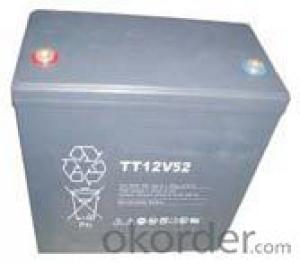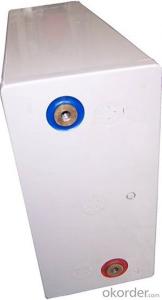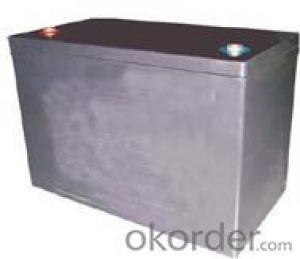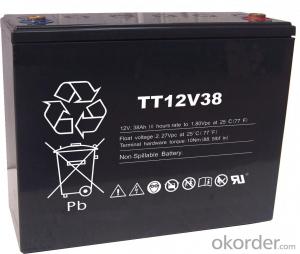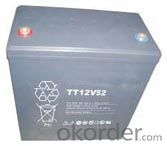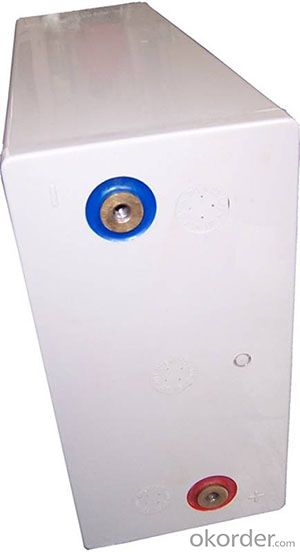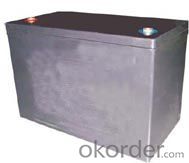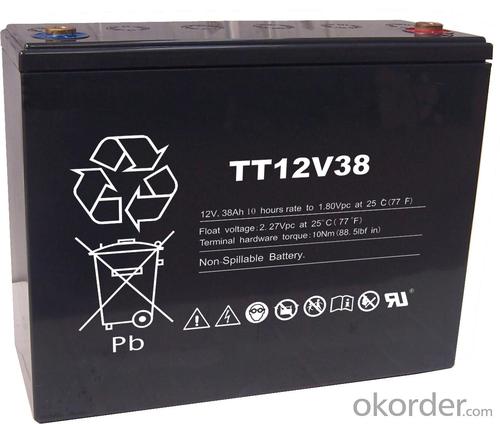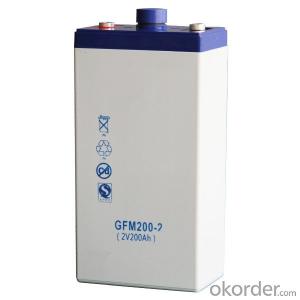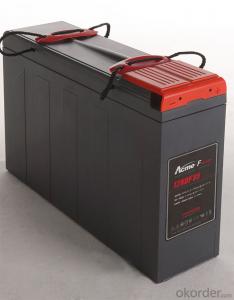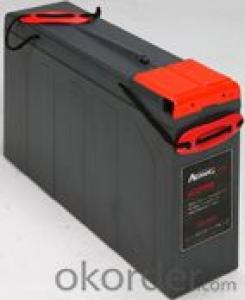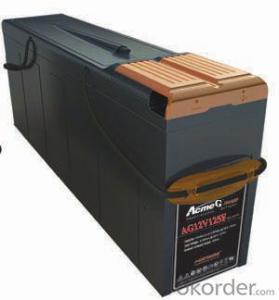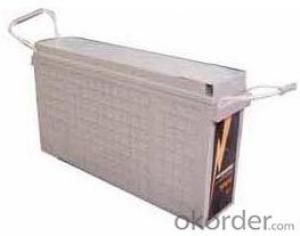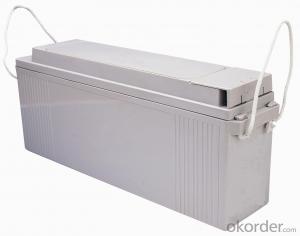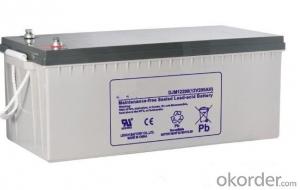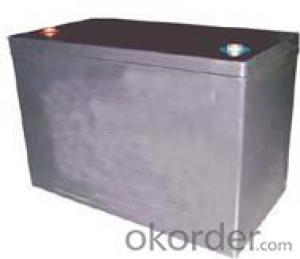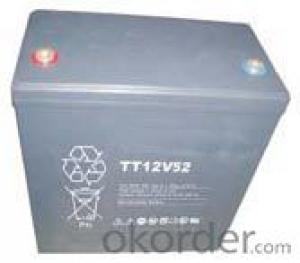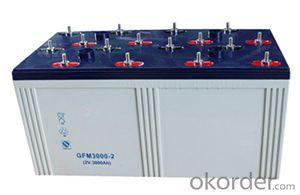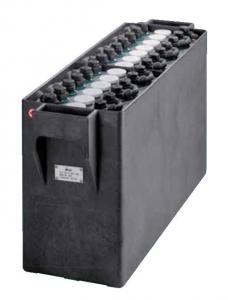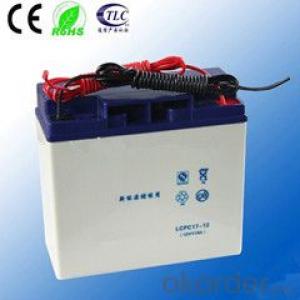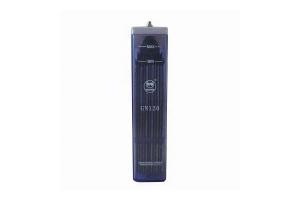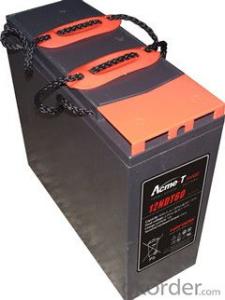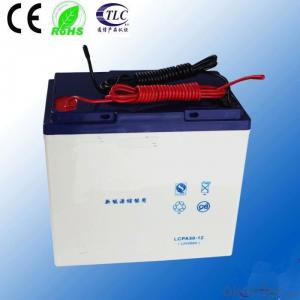Lead Acid Battery TT Series Battery TT12V32
- Loading Port:
- Shanghai
- Payment Terms:
- TT OR LC
- Min Order Qty:
- 1000 unit
- Supply Capability:
- 500000 unit/month
OKorder Service Pledge
OKorder Financial Service
You Might Also Like
Range summary:
NARADA TT series valve regulated lead acid batteries are designed with AGM(Absorbent Glass Mat) technology, high performance plates and electrolyte to gain extra power output for common power backup system applications widely used in the field of communication power, military and broadcast and television system.
The TT series batteries are ensured the quality with NARADA's QA system according to the ISO9001 and ISO14001 standard.

Technical feature:
Reliable Seal Technology
Special Patented grid alloy
Excellent high rate discharge performance
Low internal resistance AGM separator
Flame retardant ABS material container and cover compliant with UL94 V-0
Self-regulating pressure relief valve
The design float life is 12 years at 68oF(20oC)
Type: | TT12V32 | |
Voltage: | 12V | |
Nominal Capacity: | 32Ah(C10) | 32Ah(10 hours rate:) |
Length: | 220mm | |
Width: | 121mm | |
Height: | 243mm | |
Height with termial: | 246mm | |
Weight: | 17.8Kg |
Compliant standards :
IEC60896-21/22
Eurobatt guide
UL
Manufactured under system ISO9001(TUV)
Battery installation compliant with:
EN 50272-2 or local equivalents
Main application:
Cable Television
Communication Equipment
Security System
UPS
Control Equipment
Medical Equipment
Emergency Power System
Products characteristics:
Recommended float charge voltage for 12V battery:
2.25Vpc at 77oF(25oC)
Self discharge rate: < 2% per month at 25oC
Shelf life: six months at 68oF(20oC)
Valve regulated system, no water addition needed.
FAQ
![]() Is there a maximum temperature for charging lead acid batteries?
Is there a maximum temperature for charging lead acid batteries?
When charging lead acid batteries, the temperature should not exceed 120ĄăF. At this point the battery should be taken off charge and allowed to cool before resuming the charge process.
![]() Are lead acid batteries recyclable?
Are lead acid batteries recyclable?
Lead acid batteries are 100% recyclable. Lead is the most recycled metal in the world today. The plastic containers and covers of old batteries are neutralized, reground and used in the manufacture of new battery cases. The electrolyte can be processed for recycled waste water uses. In some cases, the electrolyte is cleaned and reprocessed and sold as battery grade electrolyte. In other instances, the sulfate content is removed as Ammonia Sulfate and used in fertilizers. The separators are often used as a fuel source for the recycling process.
![]() What is battery cycle life?
What is battery cycle life?
One cycle of a battery is a discharge from full charge to full discharge and a return to full charge again. The total number of cycles a battery can perform before failure is called its Cycle Life. Moat battery manufacturers will not discus the Cycle Life of their product. Many advertised Deep Cycle batteries have not been tested, or, which is the case with cranking batteries, were never designed for long Cycle Life .
- Q: How to repair the battery?
- Connect the positive and negative output of the repair instrument to the positive and negative pole of the battery, open the repair instrument, repair the battery. The first repair time should be no less than 48 hours.
- Q: What are the technical parameters of the battery?
- Battery capacity is defined as ∫ t0tdt, theoretically t can be infinite, but in fact when the battery discharge is lower than the termination voltage continues to discharge, which may damage the battery, so t value is limited, the battery industry, in hours (h) Battery sustainable discharge time, feel the C24, C20, C10, C8, C3, C1 and other nominal capacity value.
- Q: How to determine the battery is good or bad?
- General side maintenance has an observation hole if it is green to prove that the battery is normal if it is black to prove that the battery does not save electricity. There is to observe whether there is liquid exudation, if any, proved to be bad. Finally, you can touch the hand, such as feeling the battery around the plane has proved proof bad.
- Q: How to deal with waste batteries?
- Laboratory recycling method: ordinary dry battery is cylindrical, the outer cylinder made of zinc, the zinc cylinder is the battery negative; tube central carbon rod for the positive; tube for the manganese dioxide, ammonium chloride and chlorination Zinc.
- Q: Maintenance-free battery how to detect it?
- Battery pole Pole terminal has corrosive material without treatment, as long as no loose on it. If the appearance of the corrosive material, the inner surface of the terminal will also be corrosion, resulting in increased resistance, affecting the normal battery charging and discharge, it must be promptly processed.
- Q: What is the meaning of the battery above 12v65Ah?
- Voltage 12V, current 65AH, that is the capacity of 65A. (A is the unit of current. H is the time unit)
- Q: How should the battery be well maintained?
- So the proposed owners if the vehicle long-term stop, but also 2 to 3 months for the battery for a charge.
- Q: What is a maintenanceable battery?
- This is relative to a maintenance-free battery. Maintenance of the battery needs to be supplemented with electrolyte to ensure work, while maintenance-free is not required.
- Q: Battery 200ah / 104 what does that mean?
- Lead-acid battery nominal voltage is 2V / (each or monomer), but in fact will be higher than 2V, so the actual use and charging equipment for the matching will use 104, also useful 103, also useful 108 Only.
- Q: How does battery activation work?
- Always keep the battery surface clean. Found that the surface of dust and acid, it should be timely wipe, wipe can be wiped with soda water wipes wipe again, after rinse with water.
Send your message to us
Lead Acid Battery TT Series Battery TT12V32
- Loading Port:
- Shanghai
- Payment Terms:
- TT OR LC
- Min Order Qty:
- 1000 unit
- Supply Capability:
- 500000 unit/month
OKorder Service Pledge
OKorder Financial Service
Similar products
Hot products
Hot Searches
Related keywords
